
Although video has been on Wikipedia in a limited way for the past two years, it is poised to take-off with the recent introduction of Firefox 3.5 along with other imminent developments, we have learned.
Over the next few months there will be the introduction of server-side transcoding technology, a new Wikipedia video player, and a set of collaborative editing tools which will allow community members to amend videos.
Videos on the site are uploaded and watched in a format called Ogg Theora. It is a Flash-like program which is completely open-source. Video producers can render Ogg files in FinalCut and other editing programs by using various plug-ins. Once in Ogg, these files can be uploaded to Wikipedia.
Later this year, Wikipedia will allow uploads of popular file formats directly with server-side transcoding to Ogg. This plug-in is called FireOgg.
For some time, these videos have been viewable with certain Java and other plug-ins. The release of Firefox 3.5 is the first time that Ogg videos can be viewed "natively" on a browser. Opera and Chrome will support Ogg soon, but not Explorer or Safari; this news has inflamed the open source community with Apple.
Last month, we caught up with Erik Moller, deputy director of the Wikimedia Foundation at the Open Video Conference in New York. We have published our interview today.
Earlier this week, Erik told Beet.TV that Wikipedia is working on a sophisticated video player with full-screen, share, and other standard functions.
Later this year, Wikipedia will allow members to edit videos in a project funded and lead by Kaltura.
Watch Wikipedia Videos Now
We have some links to explore. The experience is not perfect, but you will find some interesting material. While you can't share the videos, you can download them. As mentioned above, there will be major improvements coming in the player. Stay tuned.
Get Ready to Upload, Al Jazeera and Others Have Started
Some media companies, including Al Jazeera, are experimenting with uploading to Wikipedia. The fast-growing Middle East television network has uploaded its coverage of last year's conflict in Gaza. It was one of a handful of news organizations with crews in the war zone.
Other media entities, non-profits, governmental organizations, and marketers will find Wikipedia extremely important for video as they find it for text now.
Bandwidth Will be an Issue, Wikimedia Foundation Seeks CDN
Right now, videos are
hosted on Wikipedia servers and there can be performance issues. How
can Wikipedia possibly manage to stream properly if video starts to
takeoff?
Erik told me that the Foundation is looking for a CDN
company to provide services at a deep discount or on a contributed
basis. This would be a good cause, indeed. We hope someone steps up
to the plate.
Update: Here's an overview on the topic by Josh Lowensohn at CNET News.com.
Andy Plesser, Executive Producer
Video Transcript
Erik Moller: Well Wikipedia's an educational medium and it's run by a non-profit organization, so we see ourselves very much in the tradition of the mission of public broadcasting organizations, of educational organizations, and so when we think of video, we don't think of the kinds of videos that you might see on YouTube of animals doing funny and interesting things, but we think of things that we can do to make complex subjects more understandable. So we want to provide both interfaces to existing encoves [sic] and repositories and tools for remixing content from those archives in order to illustrate and explain complex topics.
So, as I mentioned, we're a non-profit so we're not driven entirely by market forces. We want to make sure that our actions contribute to a healthy ecosystem and as video on the web was emerging over the last few years, it became clear that it was not a healthy ecosystem. It was an ecosystem that was controlled by just a small number of vendors controlling the formats that we use. A typical video that we see on the web is basically a black box format in a Flash container: I can easily manipulate it, I need to buy proprietary tools to really do things with it or even to rebroadcast it. So video on the web isn't as open, it's not as free and as reusable as, for example, an image on a web page or text on a web page.
We had decided many years ago already to only use open standards on Wikipedia, so we've always had, well not always, but for four years now round-about, had video on Wikipedia on a Ogg Theora format, which is an open source video format that's been around for awhile and that has really matured in the past couple of years, thanks in significant part to support from the Mozilla Foundation as well, and we are now working on technologies that will make it easier for people to do things with those videos; both to get videos from, for example, the Internet Alcove, we've been working with them, pooling an interface from their repository (they have thousands of public domain videos that could be used for Wikipedia articles), but also to take a video, to crop it, to edit it, to take different assets and mix them into a single video. Not just video. You can really just make a text slide or you could make a slide show, you can mix videos, tag them with audio obviously. So we want to build a completely open standards based environment that people can use to remix video, to set, basically, a standard for what an open ecosystem should look like and to set an example for other organizations as well, both in the educational space, non-profit organizations, and so on.
Andy Plesser: Tell us a little about the ecosystem of uploading videos and how that works.
Erik Moller: So we're going to support an extension for Firefox initially. It's called Firefogg. That extension makes it very very easy to convert video from any format into the open Ogg Theora/Ogg Vorbis formats, and that's something that you can do if you're on Firefox if you're comfortable installing an extension. We're going to explore whether we can do service-side transcoding for some of the most popular propietary formats to make it as easy as possible, and hopefully there will also be broader support in the common tools that people use. We now see first the emergence of desktop based, open-source video editing tools, so hopefully those tools too will contribute to more people working with Ogg Theora and Ogg Vorbis. So Kaltura is the technology partner. They wanna basically position themselves as sort of the minuscule of open video technologies. They want to provide services around integration, specific solutions for specific use cases, and so they see Wikipedia as a good case to demonstrate their competency. We'll obviously talk about their contribution, we'll highlight the work that they're doing, and so they are funding most of the development that's happening on this right now, but it's all open source code.


























